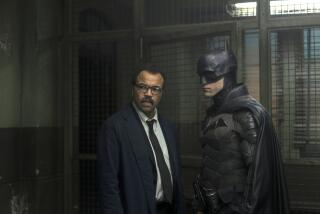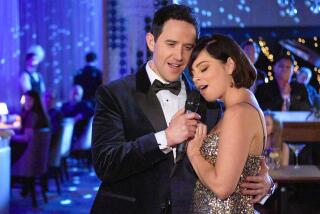There’s Lots to Learn on Saturday TV
- Share via
Television, we hear virtually everywhere, has a negative impact on the younger generation. Newspapers, magazines, even the halls of Congress are filled with everything from lament to bombast about the evils of TV. It is blamed for destroying our children’s morals, their sense of decency, their ability to read, their interpersonal skills and even their knowledge of traditional academic subjects.
But what if we were to talk about the content of television as being history, literature, science, current events, anthropology, art, music--even auto mechanics?
A review of the television offerings on a random Saturday in summer (no less) offers quite a well-rounded selection of educative programs, suited to the interest and curriculum of children ranging from primary through high school.
The family that decides to try the “education in a Saturday” should be prepared to serve meals in front of the TV, as there are few breaks in this school day. They should also be prepared to tape some segments as there is material worth saving for future study.
On one recent Saturday, this is what we found:
7 a.m.--A field trip with “Inspector Gadget” to Australia and Hawaii, where young viewers can experience the culture of the native populations, courtesy of the History Channel. Or they learn about a historical figure through A & E’s “Biography for Children.”
7:30 a.m.--A&E;’s “Year by Year for Children” gives a run-down of a given year, or kids can learn about health issues on the Family Channel’s “Healthy Kids Show.”
8 a.m.--CNN gives an update on the science and technology news of the week, and the History Channel depicts the battle between the North and South for the Port of New Orleans. Or instead kids can study the discovery of a 16th century shipwreck off the Channel Islands with the help of A&E.;
9 a.m.--The focus is on unusual occupations on AMC’s “Popular Science” show. HBO introduces us to Harriet Tubman through its “Animated Hero Classics.” (See, Saturday morning cartoons are not entirely left out on this diet.)
9:30 a.m.--PBS gives a tour of various kinds of boats (this is history, art, architecture, science). Those interested in World War II can continue with a sequence of shows on the History Channel that goes on until 11 a.m.
11 a.m.--There is more history, this time focusing on military events in Israel.
Noon--The fare changes a bit as KCBS-TV Channel 2 presents a show entitled “Success Through Education,” which provides advice on overcoming educational obstacles and enhancing self-esteem. If this show doesn’t please, Discovery features the “Popular Mechanics” show at this hour. And the History Channel takes a tour of endangered historical sites.
1 p.m.--On one channel, we can learn about firefighting throughout history, and on another about the effect of the hand-over of Hong Kong.
1:30 p.m.--HBO brings us a classic, Jane Austen’s “Sense and Sensibility.”
4 p.m.--There’s a choice: science show on the Discovery Channel, more of World War II on the History Channel or A & E’s presentation of infamous women of the Bible.
5 p.m.--Nothing to speak of. (Even the most inveterate learner deserves a supper break.)
6 p.m.--PBS begins a series of segments entitled “The Great War” that runs until 11 p.m. (How about taping this for another day?)
The availability of academic content on the TV screen offers an opportunity for parents to join in the educational process with their children. There is great potential for conversation, common understanding and even collaborative learning. This is not to say that there is not potentially harmful fare on television. There is.
But the issue is not just what children watch, but also how they learn to decide what they watch.
Influencing children’s viewing habits to include content that will contribute to their intellectual and academic development will require active parental involvement.
Parents who join their kids and their friends in viewing, discussing, questioning information and engaging in related learning activities are likely to find their children voluntarily selecting the kinds of shows listed here. And those children will likely relate television content to school content.
More to Read
The complete guide to home viewing
Get Screen Gab for everything about the TV shows and streaming movies everyone’s talking about.
You may occasionally receive promotional content from the Los Angeles Times.






